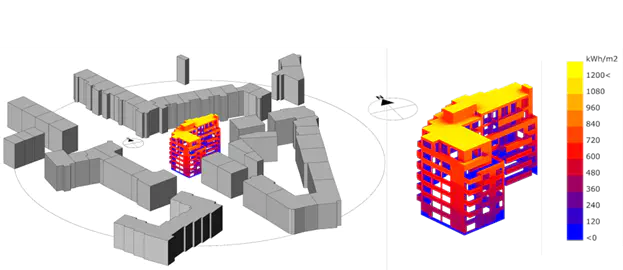Powering the City
Future City Lab Global
 Image by Viviana González, 2018, Master Thesis, Architecture and Building Systems, ETH Zurich
Image by Viviana González, 2018, Master Thesis, Architecture and Building Systems, ETH ZurichGlobally, 80% of energy is consumed primarily in urban areas today, due to urbanisation. The transition towards renewable energy systems is crucial in reducing greenhouse gas emissions and increasing liveability in cities. Switching from centralised, fossil-fuelled to decentralised and renewable electricity generation, also redefines the relation of cities to their hinterland with respect to energy. Current developments in technology, aesthetics as well as decreasing costs provide the grounds for mass deployment of BIPV in urban settings. The following research questions will be investigated in this project:
- How can, on existing buildings, both building retrofit potentials and solar yield be estimated realistically, taking into account the urban context?
- How can the utilization of solar electricity be maximized (self-consumption) by sharing, heat/cold generation and storage (sector coupling)?
- What are localized (BIPV) envelope construction systems (retrofits and new constructions; heating context Zurich and cooling context Singapore) that balance embodied vs. operational emissions.
- What are aesthetic / urban design implications of maximizing solar production in existing contexts?
- What are economic drivers and barriers to push solar retrofit, what are interactions between city and hinterland?
Funder: Future Cities Lab (FCL) Global - research collaboration between ETH Zurich and the Singapore universities – National University of Singapore (NUS), Nanyang Technological University, Singapore (NTU Singapore) and the Singapore University of Technology and Design (SUTD).